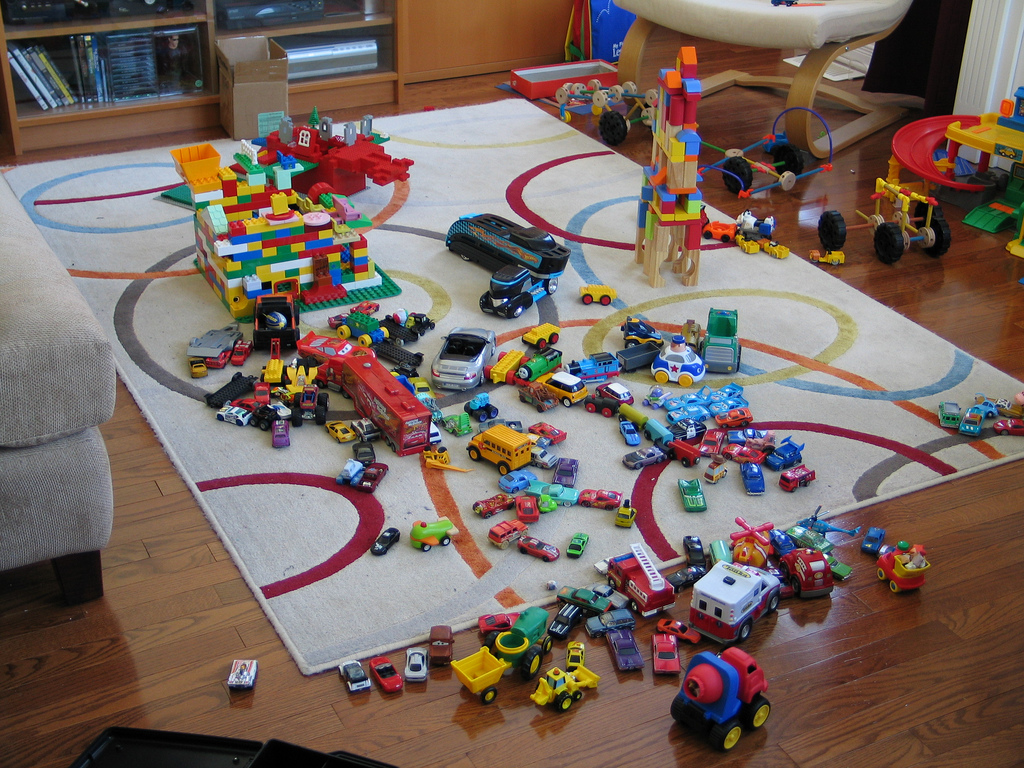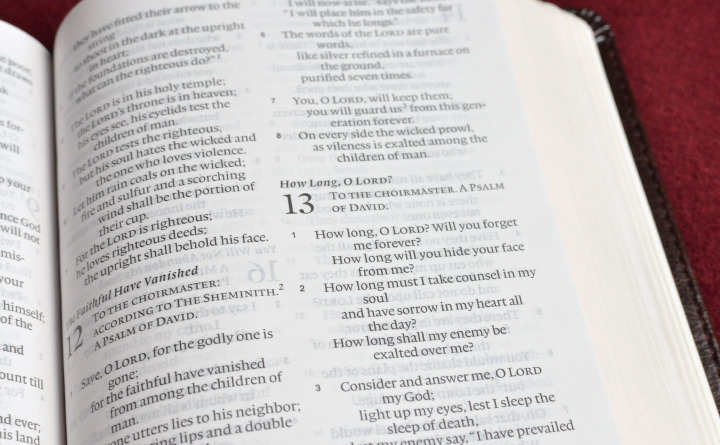Blog
Bulletin Articles
Psalm Summaries, Psalms 16-20
Monday, March 04, 2019

Psalm 16 describes how meaningful God is to David. He has no protection apart from God. He loves those who seek God and rejects idolaters. God, rather than some patch of dirt in Palestine, is his true inheritance. God gives him wisdom. Finally, in 16:8-11, David trusts in God to stand beside him, protect him from death, and give him eternal joy. This section of the psalm is quoted in Acts 2:26-28, where Peter by inspiration applies it to Jesus. It is a prophecy of Jesus’ resurrection, that even though He died, He would not undergo corruption or be abandoned to Sheol.
Psalm 17 is a plea from David to God for justice. In 17:3-5, David engages in spiritual self-analysis. He insists that his words and actions have been righteous. Next, he expresses his confidence that because God is filled with steadfast love, He will hear him. Because of this, he asks God to preserve him from wicked people. They are going to attack David like lions, and only God can defeat them. David concludes the psalm by contrasting his hope with the hope of the wicked. They look for fulfillment in this life, in riches and children, but David’s hope is to awaken to see the face of God. This reveals David’s belief that God would raise him from the dead.
Psalm 18, which also appears in 2 Samuel 22, expresses David’s joy at God delivering him from Saul. Our praise song “I Will Call Upon the Lord” is taken from 18:3, 46. 18:4-5 describes David’s peril. Vs. 6-15 poetically describes the passion and power of God’s reaction. In 18:16-24, David presents the good things that God’s deliverance accomplished. Vs. 25-30 relates this to the goodness of God’s nature. 16:31-45 goes into greater detail about God’s goodness to David and severity to David’s enemies. The Psalm concludes in vs. 46-50 with another expression of praise.
Psalm 19 is about two main ways of coming to know God. The first is through the physical creation. Vs. 1-6 point out that even though the sun, the moon, and the stars don’t actually talk, when we look up at them, they declare the glory of the One who created them. 19:7-11 discusses the other great way God reveals Himself, which is through His word. Here, David examines the perfection and goodness of God’s law. The lyrics of the hymn “The Law of the Lord” are nothing more than this section of Scripture. Vs. 12-14 describes David’s reaction to these things. He asks God to examine his spirit and keep him from evil.
Psalm 20 asks God’s blessing on the king of Israel. Presumably, David wrote this either about Saul or about himself. In either case, it asks God to protect the king, receive his sacrifices, and bless his plans. 20:6-7 explains the reason for this confidence. It is that God hears His anointed. As a result, unlike the kings of the surrounding nations, who trust in chariots and horses, Israel’s king can trust in God.
Diligence in Discipline
Monday, February 25, 2019

Proverbs 13:24 reads, “Whoever spares the rod hates his son, but he who loves him is diligent to discipline him.” Typically, when we go to this verse, we see it as being about corporal punishment. All the experts in our society tell us that spanking children harms them, but we know better (generally from personal experience), and besides, Proverbs 13:24. Certainly, I believe that there are times when my children’s backsides listen better than their ears do!
However, we ought to spend as much time in this verse considering the importance of diligence as we do defending a particular method of discipline. The contrast in the proverb isn’t really between spanking and not spanking. It’s between being diligent in discipline versus refusing to discipline when appropriate.
There are many reasons why parents, even Christian parents who believe in corporal punishment, can find themselves in the latter category. I’m here to tell you—it’s HARD to discipline children consistently! For one thing, parents who work long hours may simply not spend enough time around their children to consistently hold them to a standard. If you only have a couple hours a day with them, do you really want to spend those few hours making them do stuff and calling them down when they don’t?
Energy is another issue. I have heard legends of children who only need to be told once and then obey their parents’ wishes. It is not so with my children.
Don’t get me wrong; they’re basically good kids. However, they will gladly expend ten times as much effort evading some instruction as they would in obeying it. Never mind that simply listening the first time would be easier and less painful for everyone. They remain as intent on freedom as the plot of a Mel Gibson movie.
As a result, they are exhausting to parent. Getting them to do anything they don’t want to do requires a massive expenditure of energy, and tomorrow, there will be no evidence that the energy was expended. If the same situation arises, the same conflict will take place.
I have been known to observe that trying to train my children is about like banging on a hunk of scrap steel with a hammer. It makes a lot of noise, but it doesn’t appear to produce much change. That being the case, why not hand them the remote and let the TV and the Xbox raise them?
To myself, to my wife, and to all parents with children like that, I say, “Do not grow weary and lose heart!” It may be tempting to walk away from the daily struggle, but that won’t end well. As Shawn likes to say, if you don’t teach your children to act right, the police will. Life isn’t kind to people who haven’t learned to control themselves.
Additionally, I doubt that I am truly as ineffective as I sometimes feel. My children may be learning at a glacial pace, but they are learning. These days, they can sit through an hour-long funeral without having to be bribed with books or tablets, and that wouldn’t have been true two years ago. The signs of progress will be evident to those who look for them.
Diligence matters. It matters in everything, but it particularly matters in raising children. The more we apply ourselves to the task now, the less cause we will have to regret it later.
Chapter Summaries, Job 6-10
Monday, February 18, 2019

Job 6 is the beginning of Job’s first reply to Eliphaz. In vs. 1-7, he argues that despite Eliphaz’s insinuations, he is being treated unfairly. If he were being treated fairly, he wouldn’t be complaining! In vs. 8-12, he insists that the best thing God could do for him, if God is determined to be unfair to him, would be to destroy him completely. From there, he turns his critique on Eliphaz. He complains that Eliphaz is being a faithless friend to him, and he sarcastically insists that if he has done something wrong, Eliphaz should tell him what it is.
Job 7 continues Job’s complaint. He explains that his days are miserable, and he anticipates that he will die soon. In those circumstances, he doesn’t see any reason to hold anything back from God. He complains that God is persecuting him through every hour of the day, and he points out that if God continues to do so, He will kill him.
Job 8 is the first time that Bildad the Shuhite speaks. He insists that God would never behave unjustly toward Job, that all the bad things that have happened to Job’s children are deserved, and that if Job is righteous, God will surely deliver him. He says that this has been proven by history. Furthermore, everyone knows that the wicked will be destroyed, but that God will sustain the righteous.
Job 9 contains the first part of Job’s reply to Bildad. He begins by pointing out the impossibility of contending with God. When God is so powerful and has done so many wonderful things, who can call Him to account? Job then imagines the outcome of a contest between him and God. If it’s a contest of strength, God will crush him. If it’s a contest of justice, God is so shrewd that He will make Job look guilty even though he is innocent. He says that God is arbitrary in His dealings with mankind, treating the blameless and the wicked alike. He is afraid that no matter what he does, God will continue to punish him.
Job 10 is entirely addressed by Job to God. He wants to know why God is oppressing him so. He is bewildered that God made him so carefully, only to begin to treat him so badly. No matter what he does, he is confident that God will continue to persecute him. Job doesn’t get it. If this was the purpose that God always had in mind, why go through all the other stuff first? Why not simply let him die in the womb? All Job asks from God at this point is to leave him alone so he can die in peace.
Chapter Summaries, Job 1-5
Monday, February 11, 2019

Job 1 sketches out both the prosperity and the downfall of the title character. The first eight verses paint him as a man who has everything in both a physical and spiritual sense. He is as righteous as he is wealthy. However, his prosperity and righteousness attract the attention of Satan, who claims that the second is the result of the first. Satan seeks and receives permission from God to take away all of his blessings without harming his health. Satan does precisely this, using various means to destroy not only Job’s flocks and herds, but also his children.
Job 2 is more of the same. God and Satan have another conversation. God points out that Job, despite having lost his prosperity, has not ceased to be righteous. Satan promises different results if he is allowed to up the ante, attacking Job’s health as well. God gives Satan permission, and now Job has a plague of boils to go along with his other problems.
Job’s calamities begin to draw notice from others. His wife tells him to curse God and die. Job righteously refuses. Then, three of Job’s friends, named Eliphaz, Bildad, and Zophar, show up. They sit in mourning with him for a week, saying nothing.
Job 3 contains the first of Job’s poetic speeches. He begins it by calling a curse down on the day of his birth and the night of his conception. In Job’s view, both the day and the night have betrayed him because they allowed him to exist. He would have been far better off if he had never been born. He considers the dead with longing because they no longer have to suffer.
Instead, he wants to know why he continues to exist. For him, there is no joy in life, only suffering. The key question appears in v. 23, in which Job asks why life continues to be granted to him when God clearly is set against him.
Job 4 is the beginning of Eliphaz’s first speech. Eliphaz accuses Job of being ready to dish out spiritual correction but not so ready to take it. He then maintains that the innocent are never oppressed by God. Instead, God only makes the wicked suffer. Eliphaz then relates a vision that he saw. In this vision, a fearsome specter points out that it is impossible for man to be right in the sight of God. Even angels transgress, and we’re nothing next to them! People perish because of their sins.
Job 5 continues Eliphaz’s narrative. He points out that in his experience, it is the wicked and foolish who suffer. They bring it on themselves. He encourages Job to turn to God, who rescues the poor and needy while bringing down the proud. He thinks that Job needs to accept God’s rebuke, implying, though not saying, that he thinks that Job’s problems are sin problems. Once Job is willing to do that, all of his difficulties will clear up. Repent, Job. It’s for your own good.
Psalm Summaries, Psalms 11-15
Wednesday, February 06, 2019

Psalm 11 is David’s appeal to God in a time when he fears that God has abandoned him. He feels that even if he flees like a bird to the mountain of God (which is where the hymn “Flee as a Bird” comes from), the wicked will shoot him down. He is helpless and powerless.
However, despite his powerlessness, he still trusts in the ultimate justice of God. He appeals to God to punish his wicked enemies according to their wickedness. He concludes by expressing the contrasting hope that the Lord will reward the righteous in His presence.
Psalm 12 sets out the spiritual struggle of David with people who are lying about him. In vs.1-2, he sets out the problem: flattering and double-tongued people who trust in the power of their lies. Vs. 3-4 appeal to God to judge those who sin with the tongue. In vs. 5-6, David predicts God’s rescue of the poor and needy from the liars who oppress them. He also contrasts the lies of the wicked with the pure speech of God. The psalm concludes in vs. 7-8 with an expression of hope in the protection of God and a condemnation of the wicked whose continuing presence makes God’s help necessary.
Psalm 13 is another psalm of lamentation from David in a time when God seems absent and his enemies are all too present. He wonders is God is going to forget and abandon him forever, giving glory to David’s enemies by default. David predicts that if things keep going in the same direction, his enemies will kill him and boast in his death. However, in the conclusion of the psalm, he remembers the graciousness of God’s past dealings and expresses the confidence that God will give him reason to rejoice this time too.
Psalm 14, also by David, presents a pessimistic perspective on the foolishness and wickedness of humankind. People everywhere doubt God’s existence and give themselves over to sin. God looks down from heaven, searching for one righteous man, but He can’t find even one. It’s enough to make one wonder if David was writing this in 2019!
However, David points out a problem with the wicked. In their oppression of the poor, they aren’t reckoning with God, who protects the poor. Sooner or later, God is going to make things right. The final verse of the psalm expresses the hope that He will do so soon.
Psalm 15 presents David’s take on a much more optimistic subject: what it takes to dwell in the presence of God. He tells us that God favors those who a) live righteous lives, b) are honest with themselves, c) don’t betray others, d) love the righteous and despise the wicked, e) keep their word under all circumstances, and f) don’t oppress the poor. Do these things, and God will sustain you.


